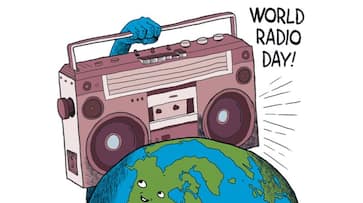Politicians and greats leaders across the world have used it for good, bad and the ugly. MyNation brings you six such famous instances of the use of radio in politics.
Radio may be the humblest of media, but it can also be the most potent. History has shown time and again that it can deliver the most momentous messages simply, directly and effectively to the last common denominator, homes of the poorest of the poor. Politicians and greats leaders across the world have used it for good, bad and the ugly.
MyNation brings you six such famous instances of the use of radio in politics.
Nehru has bad news
On January 30, 1948, a familiar voice appeared on Air India Radio (AIR) to give the nation a terrible, terrible news. Jawaharlal Nehru delivered his speech: “The light has gone out of our lives”. Mahatma Gandhi had been assassinated by a fanatic, and the then Prime Minister chose radio to reach out to Indians living in even the remotest villages and faceless towns.
The Nazi’s chosen tool
Most of the Nazi propaganda happened at night. They believed that was the time people were worked out, tired and least likely to resist a new idea hammered into their heads, however repugnant it may be. Radio was unfortunately the chosen medium, obviously because of its power and reach. In Hitler’s chief propagandist Joseph Goebbels’ words, “The German revolution would have been impossible without the airplane and the radio.”
Roosevelt’s Fireside Chats
The Great Depression had wrecked the economy, withered a generation. The then US President, Franklin Roosevelt, decided to lead his country out of it. He took to the radio. Between 1933 and 1944, we embarked on a series of 30 radio addresses named ‘Fireside Chats’. He spoke about the Emergency Banking Act and the course of World War II. Through his radio show, he was able to quell rumours and explain to his people his policies.
This is Azad Hind Radio…
Just like creating modern India’s first Army, the Azad Hind Fauj, Netaji Subhas Chandra Bose also created possibly the nation’s first pre-Independence radio service, the Azad Hind Radio. While in exile, as a fugitive from the British empire, Bose started the service from Germany in 1942 and started galvanising the nation against British occupation. The station published bulletins in English, Hindi, Bengali, Marathi, Tamil, Punjabi, Pashto and Urdu. After Netaji left for southeast Asia to continue the freedom struggle, ACN Nambiar continued the German operations.
Nachos, radio and nationalism
Radio has been a compelling tool in Mexican nationalism of the ’30s. The then new medium of radio was used to promote the national identity and muster support for the new regime. Private and government radio stations started beaming programmes that showcased distinctly Mexican folk and popular music to counter the American broadcasts.
Why Modi chose radio
Storming to power in 2014 with a historic mandate, Narendra Modi chose radio to start his Mann Ki Baat on the auspicious Vijaya Dashami. His distrust of the media, which he feels unfairly and viciously hounded him for years, made him chose a medium where he interacts directly with the people. Twitter and Facebook was doing the job. But to reach the poorest of poor in India’s remotest parts, he needed the humble radio. His keen sense of how radio has shaped history must have also contributed to the decision. He has done more than 50 episodes already, and the reach and personal connect are only growing.
Last Updated Feb 13, 2019, 11:44 AM IST









![Salman Khan sets stage on fire for Anant Ambani, Radhika Merchant pre-wedding festivities [WATCH] ATG](https://static-gi.asianetnews.com/images/01hr1hh8y86gvb4kbqgnyhc0w0/whatsapp-image-2024-03-03-at-12-24-37-pm_100x60xt.jpg)
![Pregnant Deepika Padukone dances with Ranveer Singh at Anant Ambani, Radhika Merchant pre-wedding bash [WATCH] ATG](https://static-gi.asianetnews.com/images/01hr1ffyd3nzqzgm6ba0k87vr8/whatsapp-image-2024-03-03-at-11-45-35-am_100x60xt.jpg)


